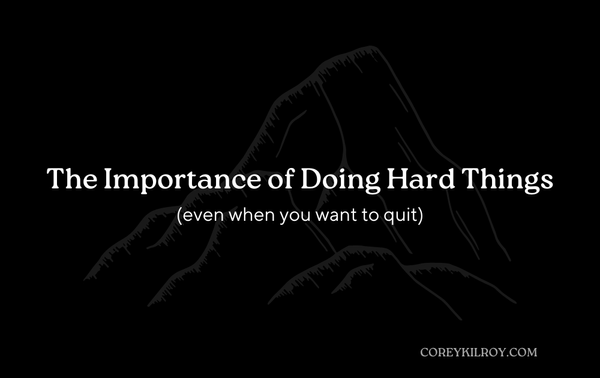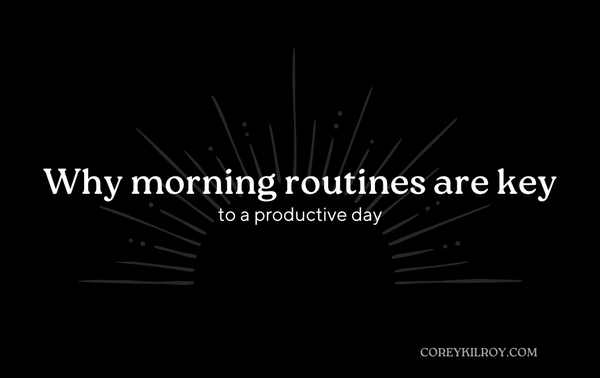You are Your Environment.

Imagine a flower in an open meadow.
Now take the same flower and slip it into the barrel of a rifle. Or place it on a gravestone.
Notice in each case how you feel. The significance changes.
In new surroundings, the same object can take on considerably different meanings.
The context changes the content.
You are 100% the product of the environment you're in.
— // Corey Kilroy (@kilroyfit) July 24, 2023
Partiers hang with partiers.
Runners run marathons together.
Millionaires create millions together.
If we want a better life, then hang with the people that will help you get there.
Let's do some critical thinking.
If you want to be a bodybuilder, a healthier eater, a better businessman, perhaps a better cook...
One of the primary ways to influence your direction toward your goals, and into a better you, is through the environment you set yourself in.
You are simply the result of the people and places you surround yourself with.
You may think that you control most of your choices, but the truth is that a large portion of your daily actions are simply a response to the environmental design around you.
I’ve been reading the infamous Atomic Habits by James Clear, who goes in-depth about how influential our environment has on us.
Here’s a quick case study:

A primary care physician at MGH in Boston, Anne Thorndike, had a crazy idea. She believed she could improve the eating habits of thousands of hospital staff and visitors without changing their willpower or motivation in the slightest way.
Thorndike and her colleagues designed a study to alter the “choice architecture” of the hospital cafeteria. They started by rearranging how drinks were placed in the cafeteria.
Originally, the fridges located next to the checkout area were filled with only soda. The researchers added water as an option in each one.
They also placed baskets of bottled water next to the food stations throughout the cafeteria. Soda was still in primary refrigerators, but water was now available at all drink locations.
You know what happened, don’t you?
Over the following 3 months, the amount of soda sales dropped by 11.4%, while bottled water sales increased by 25.8%.
They also had similar results with healthier food options in the cafeteria – and nobody said a single word to anyone eating there.
As James Clear puts it, “The most common form of change is not internal, but external: we are changed by the world around us. Every habit is context dependent” (p. 83).
Your environment is the invisible hand that shapes human behavior.
Humans naturally want to be a part of a group. We want to fit in to bond with each other, to earn respect and approval.
A common quote you might hear "The lone wolf dies, but the pack survives"...
We don't want to have to feel like we have to survive all by ourselves.
If you grew up in an unhealthy environment as a child, then your eating habits and mentality will be vastly different from someone who came from a home that consistently trains for marathons or bodybuilding competitions.
If your friends drink and party every single weekend, then guess who’s most likely to tag along?
You.
If you want a certain, desired behavior, if you want to eat healthier, work out, or whatever it may be, you need to join a group of people who are already doing it.
You need to surround yourself with those types of people, otherwise, you will most likely NOT catch the habit as easily.
Not only do you need to surround yourself with better people but around the right physical environment too.
How to Improve Your Environment
In Atomic Habits, James Clear mentions some recent research that found that people who appear to have tremendous self-control often aren’t all that different from those who are struggling.
Instead, “disciplined” people are better at structuring their lives in a way that doesn’t require immense amounts of willpower and self-control.
In simpler terms, they spend less time in tempting situations.
The people with the best self-control are typically the ones who need to use it the least.
It’s easier to practice self-restraint when you don't have to use it very often.
Yes, grit and willpower are essential for success, but the way to improve these qualities is not by wishing you were more disciplined, but rather by creating a more disciplined environment.
There’s a story of a therapist from Texas, Patty Olwell, who started smoking when riding horses with a friend. Eventually, she quit smoking and hadn’t had a cigarette for years after. Simultaneously, however, she also stopped riding.

Decades later, she hopped on a horse again and found herself craving a smoke for the first time in forever.
The cues for smoking were still internalized, even when she hadn’t been exposed to them in a long time.
Once a habit has been encoded, the urge to act follows whenever the environmental cues appear.
This could go for any situation in your life.
If every time you sit down to watch a movie, you crack open a bag of Doritos, then your stomach will start growling, and your mouth will start salivating like a dog for those tortilla chips, every time you sit on the couch for a movie.
Instead of relying on willpower to stop a bad habit, rid yourself of those negative cues and create an environment that promotes healthier habits.
Your energy would be better spent optimizing your environment for doing the right thing rather than purely relying on willpower.
Get rid of unhealthy snacks, hire a trainer at the gym for some more accountability, place your phone in a different room when you’re working, get better friends who don’t party all the time, etc., etc.
Set yourself up for success instead of failure.
Then your self-discipline doesn’t have to work as hard.
In the end…
- Our environment dictates the type of behavior we’re most likely to partake in.
- Every habit and internal cue is context-dependent and influenced by external factors.
- Set yourself up for success by creating and surrounding yourself in a much more encouraging environment. One that benefits you and does not influence you to do bad things.
🙇🏻♂️🌱 Until Next Time, C.



